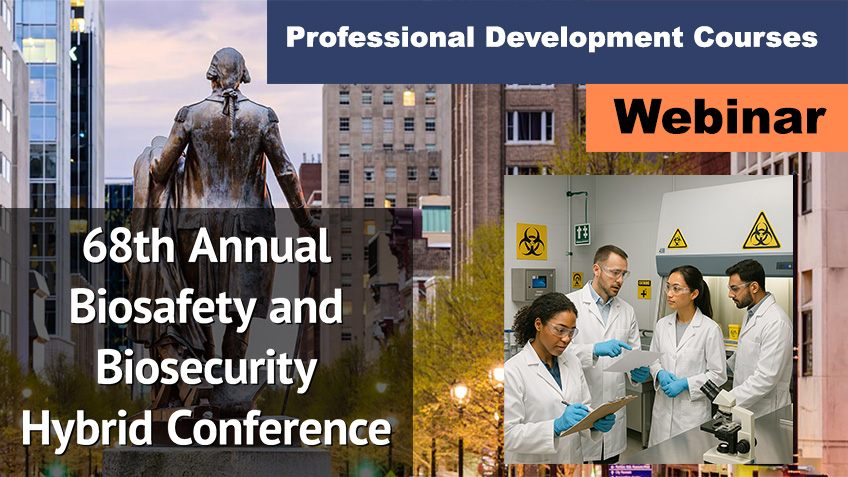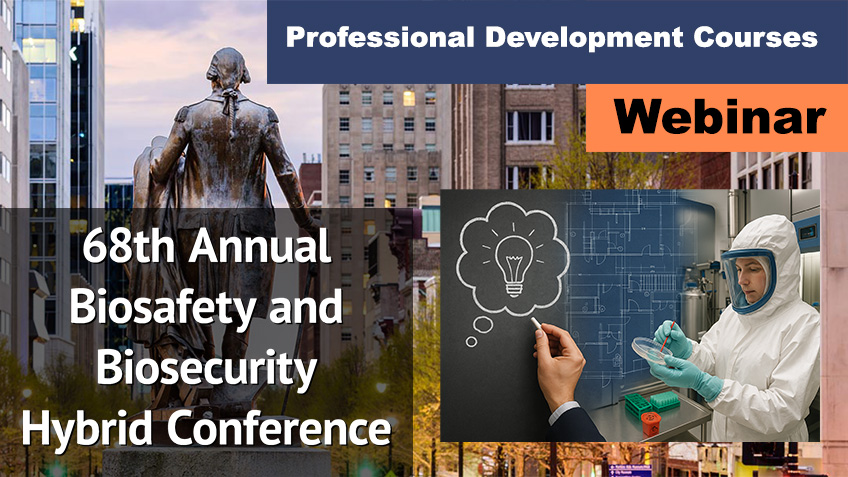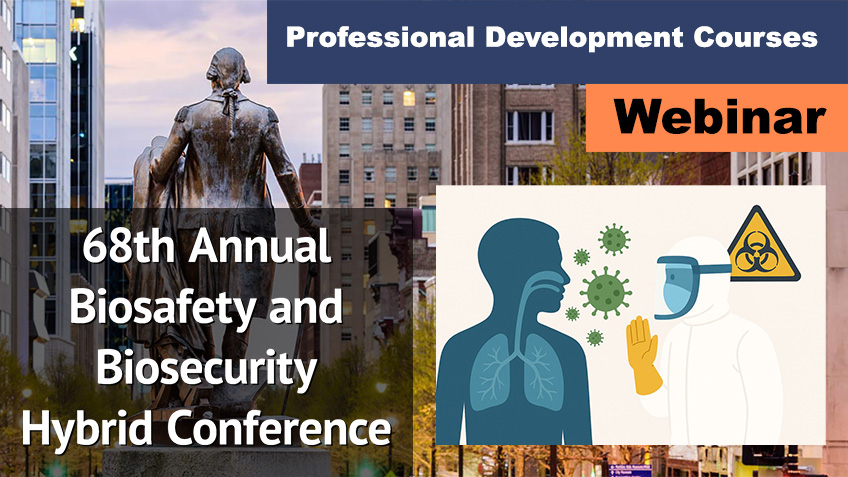BASIC LEVEL COURSES
October 24-26, 2025
Friday, October 24, 2025, 8:00 AM – 5:00 PM
1. BSL-3 Operations and Management
This course will review the important aspects of BSL-3 Operations and Management from two points of view; “hardware” (i.e., facilities & equipment issues) and “software” (i.e., administrative controls). It will cover various aspects you need to consider in order to operate a BSL-3 facility, such as training, maintenance support, occupational health, waste management, maintenance, performance verification, and emergency response. The instructors will encourage interaction and the exchange of experiences among the attendees. Regulatory aspects from any specific country, or planning, design, or construction-related issues will not be covered.
Objectives:
- Describe the elements of BSL-3 Operations and Management (risk management, primary barriers, annual performance verification, emergency response, etc)
- Recognize institutional, management, and user responsibilities
- Summarize approaches to developing manuals, SOPs, and training
Suggested Background: Basic Risk Assessment and familiarity with BSL-3 Concepts
Target Audience: Safety Professionals, BSL-3 Managers, Containment Engineers, Lab and Scientific Directors
Audience Level: Basic
COURSE FACULTY
CONTACT HOURS
This course has been approved for 1.0 CM points toward RBP/CBSP recertification. ABSA International is approved as a provider of continuing education programs in the clinical laboratory sciences by the ASCLS P.A.C.E.® Program. This course is approved for 7.5 P.A.C.E.® contact hours.
Friday, October 24, 2025, 8:00 AM – 5:00 PM
2. Infectious Substance Shipping Certification
This course is appropriate for those who have some experience with infectious substance handling or shipping but may not have been certified within the past three years. The course utilizes several facilitated learning activities. Attendees have opportunities to mark, label, package and complete documentation for a variety of infectious substances shipments (Category A, Category B, Exempt Patient Specimens). This course would be appropriate for those responsible for packaging, marking, labeling shipments of all categories of infectious substances, dry ice and liquid nitrogen. Attendees have both an online exam (score at least 80%) and practical exercises to complete to demonstrate competency. Successful completion of the course will qualify attendees for IATA/DOT certification.
Objectives:
- Demonstrate competency to meet IATA infectious substance shipping certification requirements
- Restate and demonstrate how to properly package, mark/label, document and prepare shipments of category A and B infectious substances and other non-regulated biological materials
- Paraphrase any regulatory changes over the past several years and apply them to meet regulatory re-training requirements
Suggested Background: None
Target Audience: All Safety Professionals, New Biosafety Professionals, Laboratory Workers
Audience Level: Basic
COURSE FACULTY
CONTACT HOURS
This course has been approved for 1.0 CM points toward RBP/CBSP recertification. ABSA International is approved as a provider of continuing education programs in the clinical laboratory sciences by the ASCLS P.A.C.E.® Program. This course is approved for 7.5 P.A.C.E.® contact hours.
Friday, October 24, 2025, 8:00 AM – 5:00 PM
3. Preparing for and Responding to Laboratory Emergencies – Are you prepared?
Biosafety professionals often provide fundamental training for research and healthcare staff to work safely and respond to potential emergencies involving a wide range of biological hazards. Training employees to proactively identify and take appropriate actions to minimize the likelihood and impact of these types of incidents helps to minimize the development of serious and/or irreversible consequences. This course reviews the process for developing an effective emergency response plan, emphasizing the importance of a comprehensive and well-coordinated training program for laboratory staff, institutional incident response team members, and local first responders (e.g., emergency management services, fire, police, emergency dispatchers) when biological hazards are involved. Specific topics to be addressed include: the basic components of a comprehensive institutional emergency response plan; laboratory-specific contingency plans, emphasizing unique considerations for emergencies that involve biological hazards; staff roles and responsibilities during emergencies; communication strategies and protocols during an emergency event; and training and effective preparedness exercises to ensure a coordinated response effort.
Objectives:
- Review key components of the emergency management cycle as it applies to research institutions and laboratories
- Identify the various roles and responsibilities that are critical to an effective response
- Summarize ways to coordinate and communicate effectively with institutional and local authorities during an emergency
Suggested Background: Biosafety and Biosecurity Training Course (BBTC®), Fundamentals of Biosafety
Target Audience: All Safety Professionals, Laboratory Workers, New Biosafety Professionals
Audience Level: Basic
COURSE FACULTY
CONTACT HOURS
This course has been approved for 1.0 CM points toward RBP/CBSP recertification. ABSA International is approved as a provider of continuing education programs in the clinical laboratory sciences by the ASCLS P.A.C.E.® Program. This course is approved for 7.5 P.A.C.E.® contact hours.
Saturday, October 25, 2025, 8:00 AM – 5:00 PM
5. Facilities Fundamentals for Biosafety Professionals
This course is aimed at strengthening biosafety professionals knowledge of how facility operations support overall biocontainment operations. Through a mixture of presentations from experts in the field and interactive exercises, attendees will reinforce their knowledge of facility system function and their roles in facility design, construction, and operation. The target audience for the course is biosafety professionals who come with backgrounds other than facilities, and it is open to both newcomers and seasoned veterans in the field. The first portion of the course will familiarize attendees with the general concepts biosafety-related facility design and their roles in it, along with the fundamentals of HVAC system operation in the context of BSL-2 and BSL-3 facilities. Topics in this portion of the course include: the role of biosafety personnel in biocontainment facility design, renovation, and operations, understanding design drawings and related construction documents, what the relationship is of facility features to biosafety levels, and HVAC components and their function relative to biocontainment. This section will end with the introduction of an interactive exercise on reviewing design drawings. The instructors will lead interactive exercises and discussions of more detailed aspects of containment facilities and their operation, including: specific infrastructure, equipment, and systems related to operation of a biocontainment facility; autoclave function, waste management, associated facility infrastructure; room decontamination in relation to facility components; interactions between facilities and containment equipment; security, operations, and biosafety.
Objectives:
- Restate the roles of biosafety professionals in facility design and operation
- Explain practical approaches for reviewing design documents.
- Describe the function of discrete facility infrastructure, equipment, and systems related to biocontainment facility operations
Suggested Background: Fundamentals of Biosafety, Principles and Practices of Biosafety® (PPB), Risk Assessment
Target Audience: All Biosafety Professionals, All Safety Professionals
Audience Level: Basic
COURSE FACULTY
CONTACT HOURS
This course has been approved for 1.0 CM points toward RBP/CBSP recertification. ABSA International is approved as a provider of continuing education programs in the clinical laboratory sciences by the ASCLS P.A.C.E.® Program. This course is approved for 7.5 P.A.C.E.® contact hours.
Saturday, October 25, 2025, 8:00 AM – 5:00 PM
6. Beginners’ Guide to Comprehensive Biorisk Management: Integrating Biosafety and Biosecurity Practices
This course provides attendees with a comprehensive foundation in biorisk management by integrating biosafety and biosecurity principles within a unified risk assessment framework. Centered around the AMP (Assessment, Mitigation, Performance) model, the course delivers practical tools for identifying, evaluating, and mitigating risks associated with the handling of biological agents and toxins. Attendees will gain a solid understanding of biosafety and biosecurity risk assessments and learn how to apply core assessment strategies effectively. Through a dynamic mix of lectures, real-world case studies, and hands-on group exercises, attendees will explore both foundational and emerging issues in biorisk management. The course emphasizes actionable strategies that can be tailored to diverse institutional environments and translated into improved safety and security practices. Attendees will conclude the course with enhanced awareness of complex biorisk scenarios and the skills to implement risk-informed mitigation measures within their own organizations.
Objectives:
- Describe the AMP model of biorisk management and utilize it to address biological risks
- Develop and implement effective risk mitigation strategies including engineering controls, administrative controls, work practices, and personal protective equipment
- Summarize how the five pillars of biosecurity support biorisk programs, inform performance evaluation and stakeholder engagement to stregthen safety culture
Suggested Background: Micro/Molecular Biology 101
Target Audience: New Biosafety Professionals, All Safety Professionals
Audience Level: Basic
COURSE FACULTY
CONTACT HOURS
This course has been approved for 1.0 CM points toward RBP/CBSP recertification. ABSA International is approved as a provider of continuing education programs in the clinical laboratory sciences by the ASCLS P.A.C.E.® Program. This course is approved for 7.5 P.A.C.E.® contact hours.
Saturday, October 25, 2025, 8:00 AM – 5:00 PM
7. Engineering for the Biosafety Professional Part 2
Proactive biosafety professionals need to be involved and knowledgeable in the operation, maintenance and certification of their containment facilities and building systems. Frequently, the biosafety professional is called upon to participate in the planning, design, and validation of a new biocontainment laboratory or renovation of an existing facility. For the biosafety professional to participate in these activities, they need a foundation of engineering fundamentals, develop skills to ask questions in engineering terms, and have the confidence to question the answers. This course provides engineering principles that are useful in the planning, design, construction, maintenance and operation of a BSL-3 or high containment facility. The principles are expanded to BSL-4 or maximum containment facilities for clarity between BSL-3 and BSL-4 requirements. The information covered in this course is specific to NIH, CDC, and BMBL 6th ed. requirements.
Objectives:
- Discuss engineering principles
- Apply engineering assessment tools for architectural and engineering drawings
- Implement engineering solutions
Suggested Background: None
Target Audience: All Safety Professionals, Operations and Maintenance Staff
Audience Level: Basic
COURSE FACULTY
CONTACT HOURS
This course has been approved for 1.0 CM points toward RBP/CBSP recertification. ABSA International is approved as a provider of continuing education programs in the clinical laboratory sciences by the ASCLS P.A.C.E.® Program. This course is approved for 7.5 P.A.C.E.® contact hours.
Saturday, October 25, 2025, 8:00 AM – 12:00 PM
9. Nanoparticles in Modern Science—Understanding Hazards, Controls, and Safe Practices
Nanotechnology is revolutionizing many areas of modern life, offering innovative solutions across medicine, science, engineering, and technology. Nanoparticles (NPs), with their unique properties, are defined by composition, size, shape, and surface characteristics, hold significant promise in these fields. However, these same properties present challenges in recognizing, evaluating, and mitigating potential environmental, health, and safety risks associated with the production and application of nanoparticles. This course introduces the types, properties, production and synthesis of nanoparticles, focusing on their interactions with biological systems and associated chemicals, as well as potential implications of radiolabeled nanoparticles. This understanding is crucial for developing effective risk assessment and mitigation strategies for both in-vivo and in-vitro applications. It covers biosafety, biosecurity, and occupational health risks, emphasizing hazard identification, control measures, and knowledge gaps in nanotechnology. Through case studies and interactive exercises, attendees will explore best practices for safe handling, waste management, exposure assessment, and transport of nanoparticles. These hands-on activities will reinforce key concepts, fostering peer learning and collaboration.
Objectives:
- Identify common types of nanoparticles and their key properties
- Evaluate potential risks and safety concerns associated with the production and use of nanoparticles, including occupational exposure and environmental impacts.
- Develop and implement effective risk management strategies for laboratory projects involving nanoparticles, including hazard identification, exposure controls, and best practices for safe handling, waste disposal, and transport
Suggested Background: None
Target Audience: All Safety Professionals, Laboratory Workers, Animal Caretakers
Audience Level: Basic
COURSE FACULTY
CONTACT HOURS
This course has been approved for 0.5 CM points toward RBP/CBSP recertification. ABSA International is approved as a provider of continuing education programs in the clinical laboratory sciences by the ASCLS P.A.C.E.® Program. This course is approved for 3.5 P.A.C.E.® contact hours.
Saturday, October 25, 2025, 8:00 AM – 12:00 PM
10. The Big Bright Beautiful World of BSL-2
Ever wondered why handling human blood samples and culturing infectious influenza both require BSL-2 containment? Or the defining characteristics between BSL-2 and BSL-1 or BSL-3? This course transforms biosafety from a checklist into a strategic risk management framework, adaptable to any facility or resource level. We’ll go beyond textbook scenarios, tackling the gray areas of BSL-2 where critical thinking and adaptability are key. Starting with a rapid refresher on core biosafety principles, we’ll explore how to adjust BSL-2 containment ‘levers’ for real-world applications, even in non-ideal or resource-limited labs. This course isn’t just about following rules—it’s about understanding why they exist. Attendees will explore key topics in biosafety, including distinctions and special considerations of BSL-2 and ABSL-2, the critical difference between regulations and recommendations on lab operations, compare global biosafety guidelines with the BMBL, safe handling of RG-3 agents in BSL-2 settings, emerging BSL-2+ practices, and real-world case studies—such as HIV and SARS-CoV-2—through interactive activities. This course empowers new biosafety professionals to move beyond a rigid, one-size-fits-all approach. Attendees will develop the confidence to make informed, customized containment decisions—becoming strategic biosafety leaders in their field.
Objectives:
- Utilize the BMBL as a framework and move beyond a checklist approach and apply adaptive biosafety practices in diverse laboratory settings, including resource-limited or non-ideal facilities
- Explain BSL-2 containment principles and practices and how this relates to “BSL-2+” containment and allows for the handling of Risk Group 3 agents under BSL-2 conditions
- Adapt the foundation necessary to confidently make non-textbook containment recommendations that will meet BSL-2 recommendations and keep researchers safe
Suggested Background: None
Target Audience: New Biosafety Professionals, All Safety Professionals, Animal Caretakers
Audience Level: Basic
COURSE FACULTY
CONTACT HOURS
This course has been approved for 0.5 CM points toward RBP/CBSP recertification. ABSA International is approved as a provider of continuing education programs in the clinical laboratory sciences by the ASCLS P.A.C.E.® Program. This course is approved for 3.5 P.A.C.E.® contact hours.
Saturday, October 25, 2025, 1:00 PM – 5:00 PM
11. Writing Effective Standard Operating Procedures
This course will offer attendees an understanding of key principles for writing effective standard operating procedures (SOPs). An introduction to the importance of SOPs in achieving desirable and consistent outcomes and issues that must be considered in the SOP writing process will be presented. Examples will include some of the most common human behavior considerations such as compliance, behavioral evolution, complaisance, and strategies to address behavioral concerns that may arise. Attendees will engage in guided discussions about the benefits of an effective SOP writing process and the most common mistakes made by the authors of SOPs. The course will take attendees through the process of writing feasible standard operating procedures (SOPs) including SOP evaluation and validation. Through group interactions, attendees will develop examples of SOPs to illustrate effective writing concepts, present their SOPs to the class, and evaluate each other’s SOPs for feasibility. Instructors will guide attendees through the process by providing critical feedback on the SOP writing process as they progress. The goal of this course is to increase attendees’ awareness of issues that arise when writing standard operating procedures and how these issues affect SOP compliance. Furthermore, the course will provide examples of well-written SOPs that contribute to overall SOP compliance at an institution. The course is intended for those who want to be able to lead or aid in the creation of feasible and effective SOPs in order to enhance both biosafety and biosecurity at their institution.
Objectives:
- Summarize the range of issues that must be considered when writing effective standard operating procedures (SOPs), including human behavior
- Identify strategies for writing effective SOPs
- Illustrate how good standard operating procedures (SOPs) work to enhance both biosafety and biosecurity
- Recognize the value of “feasible” and therefore effective standard operating procedure (SOP) in promoting biosafety and biosecurity best practices
Suggested Background: Fundamentals of Biosafety
Target Audience: All Safety Professionals, New Biosafety Professionals, Laboratory Workers, International Attendees
Audience Level: Basic
COURSE FACULTY
CONTACT HOURS
This course has been approved for 0.5 CM points toward RBP/CBSP recertification. ABSA International is approved as a provider of continuing education programs in the clinical laboratory sciences by the ASCLS P.A.C.E.® Program. This course is approved for 3.5 P.A.C.E.® contact hours.
Saturday, October 25, 2025, 1:00 PM – 5:00 PM
12. Integrating Cyberbiosecurity into Laboratory Biosecurity Programs: Addressing Emerging Threats in the Digital Age
As laboratories adopt AI, digital data systems, and networked instruments, cyberbiosecurity—the intersection of cybersecurity and biosecurity—has become vital. This interactive course introduces cyberbiosecurity as an essential discipline, equipping attendees with the knowledge and strategies to safeguard laboratory Information and Communications Technology (ICT), Operational Technologies (OT), and data assets against evolving cyber threats. Attendees will explore the fundamentals of cyberbiosecurity by diving into key concepts such as identifing laboratory assets, mapping data, and assessing vulnerabilities. Attendees will learn how to conduct comprehensive threat and vulnerability assessments and apply these principles to reinforce biosecurity programs through structured guidance and practical activities. As cyber threats continue to evolve, biosecurity programs must stay agile—capable of identifying, mitigating, and recovering from cyberattacks. This course presents strategies for strengthening cyberbiosecurity resilience through a collaborative, multidisciplinary approach that blends technical skills, professional roles, and oversight responsibilities. Through interactive activities, group discussions, and mapping exercises, participants will evaluate real-world risks and co-develop tailored solutions for laboratory settings. At the end of the course, attendees will be equipped with practical tools to embed cyberbiosecurity into their biosecurity frameworks, ensuring their labs remain secure and adaptable in a dynamic threat environment.
Objectives:
- Define and identify laboratory cyberbiosecurity assets, threats, vulnerabilities, and risks
- Apply threat and vulnerability assessment techniques and develop risk mitigation strategies to enhance laboratory resilience
- Develop a team-based approach to cyberbiosecurity management as an emerging critical component of an overall biosecurity program
Suggested Background: None
Target Audience: Laboratory Workers, All Safety Professionals
Audience Level: Basic
COURSE FACULTY
CONTACT HOURS
This course has been approved for 0.5 CM points toward RBP/CBSP recertification. ABSA International is approved as a provider of continuing education programs in the clinical laboratory sciences by the ASCLS P.A.C.E.® Program. This course is approved for 3.5 P.A.C.E.® contact hours.
Sunday, October 26, 2025, 8:00 AM – 12:00 PM
18. Flipping the Table: Effective Tabletop Exercise Design and Execution
Tabletop exercises (TTXs) are an essential part of a biosafety professional’s toolkit. It offers a safe, efficient way to “stress test” the resilience of an organization’s protocols in the face of hypothetical worse-case scenarios, making them particularly valuable for reinforcing staff training, enhancing coordination and communication between teams and team members, and identifying opportunities to improve plans and procedures. Additionally, TTXs can be used to help develop new processes and procedures in support of the stand up or expansion of activities, serving as a platform for identifying critical supporting processes and procedures that need to be in place for the activity to be completed effectively. The effectiveness of tabletop exercises (TTXs) in identifying areas for improvement can be undermined by poor planning, weak execution, and insufficient follow-up. In this course, attendees will develop an understanding of when and why they should consider conducting a TTX, participate in the development of a mock exercise, and propose appropriate follow-up actions to their exercise.
Objectives:
- Identify when, why, and what type of TTX would be useful to achieve a specific outcome
- Analyze the effort needed to design and conduct an effective TTX
- Describe appropriate follow-up actions to a TTX that ensure the continual improvement of the process or program test
Suggested Background: None
Target Audience: New Biosafety Professionals, All Safety Professionals
Audience Level: Basic
COURSE FACULTY
CONTACT HOURS
This course has been approved for 0.5 CM points toward RBP/CBSP recertification. ABSA International is approved as a provider of continuing education programs in the clinical laboratory sciences by the ASCLS P.A.C.E.® Program. This course is approved for 3.5 P.A.C.E.® contact hours.
Sunday, October 26, 2025, 1:00 PM – 5:00 PM
19. Boots on the Ground: Developing Field Laboratories in Resource-Limited Settings
This course provides attendees with the knowledge and practical skills needed to conduct research and clinical trials in international settings. It covers key aspects of fieldwork, including ethical considerations, cultural competency, regulatory requirements, data collection methods, and logistical challenges. Attendees will explore case studies and participate in hands-on training to develop strategies for navigating diverse healthcare environments, working with local stakeholders, and ensuring compliance with global research standards. Attendees will conclude the course equipped to design and implement field research projects in international contexts, addressing real-world health challenges while upholding scientific integrity and ethical responsibility.
Objectives:
- Design and Plan Fieldwork—Create a research or clinical trial protocol that includes logistics, site selection, stakeholder collaboration, and risk mitigation
- Manage Challenges in Global Research—Identify and develop solutions for common challenges such as regulatory approvals, weather emergencies, infrastructure limitations, and data security
- Implement Data Collection Methods—Utilize appropriate qualitative and quantitative data collection techniques suited for international and resource-limited settings
Suggested Background: None
Target Audience: Laboratory Workers, All Safety Professionals
Audience Level: Basic
COURSE FACULTY
CONTACT HOURS
This course has been approved for 0.5 CM points toward RBP/CBSP recertification. ABSA International is approved as a provider of continuing education programs in the clinical laboratory sciences by the ASCLS P.A.C.E.® Program. This course is approved for 3.5 P.A.C.E.® contact hours.
Sunday, October 26, 2025, 1:00 PM – 5:00 PM
20. No Resources? No Problem! A Dynamic Workshop for Improving Biosafety Program Visibility and Leadership Engagement
Building a holistic and comprehensive biorisk management program requires serious leadership commitment across your organization in order to drive successful mitigation strategies and compliance metrics. Biosafety Officers alone cannot develop, maintain, or continuously improve safety programs and require infrastructural support both within safety verticals as well as externally across divisions. It’s easy to lose sight of key objectives and results when faced with a mountain of operational issues, frustrated by a lack of resources, and feeling disconnected from leadership. Where do you begin when standing up a new biosafety program? What about implementing enterprise risk management solutions to mature an existing one? What are the pitfalls to avoid and how do you strategically engage leadership? This course will reinforce cornerstone pieces of biosafety program management with four highly interactive hands-on exercises to help drive solutions at your respective institutions. These exercises include leading indicator metrics, SOAR analysis, accountability and responsibility, and how to use appreciative inquiry as a tool for continuous improvement.
Objectives:
- Critique your respective biosafety program’s strengths and opportunities for improvement, both short and long term, and how to drive leadership engagement for support
- Establish a solutions-oriented approach that include leading indicator metrics based on SMART principles (specific, measurable, attainable, relevant, time-bound).
- Participate in hands-on exercises (4) and a discussion to foment tangible strategies to bring back to your institution, with a special emphasis on responsibility and accountability in safety program management
Suggested Background: None
Target Audience: All Safety Professionals, All Biosafety Professionals
Audience Level: Basic
COURSE FACULTY
CONTACT HOURS
This course has been approved for 0.5 CM points toward RBP/CBSP recertification. ABSA International is approved as a provider of continuing education programs in the clinical laboratory sciences by the ASCLS P.A.C.E.® Program. This course is approved for 3.5 P.A.C.E.® contact hours.
Webinars
Virtual Professional Development Courses – Webinars
All times listed are in CENTRAL TIME ZONE
September 12 – November 14
Although these courses are part of the Professional Development Program for the 68th Annual Biosafety and Biosecurity Hybrid Conference, it is not necessary to be a conference participant to register for these courses. Registration for the virtual professional development courses must be purchased on separate registration forms from the conference registration.
Friday, September 12, 2025 | 11:00 am – 3:00 pm CDT
1V. A Helpful Guide to Becoming a Well-Rounded Biosafety Professional Workshop

Biosafety professionals must grasp the complexity of various hazards present in laboratories, which include not only biological agents but also chemical, radiological, and physical hazards. This course will provide an overview of these key hazards and equip participants with the knowledge needed to assess and mitigate risks within their institutions. Topics will cover biological hazards (including risk assessments and a brief review of laboratory regulations), select agents, chemical hazards (with an emphasis on safety data sheets and hazard communication), industrial hygiene (including respiratory safety, air quality, and waste anesthetic gas management), radiological hazards (including lasers), and animal-related hazards (such as physical risks and allergens). The course will conclude with practical tabletop exercises, allowing participants to apply the concepts learned throughout the course, including risk assessment development, emergency response, and handling unique laboratory conditions.
What You’ll Learn
- Biological Hazards – Summarize risk assessment methodologies, laboratory regulations, and the handling of select agents
- Industrial Hygiene – Discuss respiratory protection needs, air quality monitoring and control, and safe handling and storage practices
- Tabletop Exercises – Develop risk assessments, an emergency response plan, and use scenarios to problem solve unique lab conditions
Objectives:
- Identify the diverse hazards encountered in laboratory settings and resources required to manage laboratory safety effectively
- Summarize the principles of risk assessment and how to apply them to laboratory environments
- Develop strategies to mitigate biological and non-biological hazards in the laboratory.
Suggested Background: None
Target Audience: New Biosafety Professionals, Laboratory Workers
Audience Level: Basic
Course Length: 4 hours (with a 15-minute break)
Questions
Please direct questions about this course to:
KariAnn DeServi, MEd
Director of Education, ABSA
866.425.1385 / education@absa.org
To receive the ABSA member rate, participants must be current ABSA members during the training year.
Course was one 4-hour session. Within 10 business days of purchasing the recording, you will be added to the course on the ABSA International Training Site. If you have already taken ABSA courses, then you will receive an enrollment notification. If you are a new user, you will receive an invitation to create your account on the ABSA International Training Site. Once the account is created, you will see the course on your course dashboard. You will have 60 days to complete the course.
COURSE FACULTY
COURSE FEES
ABSA Member: $300
Non-member: $390
To receive the ABSA member rate, participants must be current ABSA members during the training year. Fees include course handouts, access to the ABSA International training site, and 4 hours of expert-led interactive instruction.
CONTACT HOURS
This course has been approved for 0.5 CM points toward RBP/CBSP recertification. *ABSA International is approved as a provider of continuing education programs in clinical laboratory sciences by the ASCLS P.A.C.E.® Program. This course is approved for 3.5 P.A.C.E.® contact hours. Course access links are unique and for individual use only. Sharing is prohibited. Duplicate logins or unregistered attendees will be removed from the webinar without a refund.
Friday, September 26 and Friday, October 3, 2025 | 11:00 am – 3:00 pm CDT
3V. Introduction to the Science and Biosafety of Cell and Gene Therapy Clinical Trials

The use of recombinant and synthetic nucleic acid molecules in clinical trials is growing at an explosive pace. This course is intended to introduce biosafety professionals to the science and biosafety of gene-based investigational products in clinical trials including gene-based vaccines, gene modified cellular products, gene therapy and gene editing. This course will provide an overview of molecular biology, virology and viral vectors. Participants will discuss risk assessments and best practices for dealing with risks associated with diverse types of biological hazards.
What You’ll Learn
- Scientific Foundations of Gene-Based Clinical Trials – understanding molecular biology, virology, and viral vectors relevant to gene-based investigational products
- Biosafety Considerations for Emerging Biotechnologies – learn how to identify and manage risks related to recombinant and synthetic nucleic acid molecules
- Risk Assessment and Best Practices – emphasis on conducting biosafety risk assessmentsand applying best practices for handling diverse biological hazards in clinical trial settings
Objectives:
- Restate the basic molecular biology and microbiological principles behind gene-based vaccines, gene modified cellular therapies and gene therapies
- Summarize how to conduct a risk assessment for gene-based vaccines, gene modified cellular therapies and gene therapies
- Identify viral vectorology (properties, uses, and risks associated with commonly utilized viral vectors)
Suggested Background: None
Target Audience: All Safety Professionals, Laboratory Workers, New Biosafety Professionals, Research Administrators, Clinical Professionals
Audience Level: Basic
Course Length: 8 hours (two 4-hour live sessions, each with a 15-minute break)
Questions
Please direct questions about this course to:
KariAnn DeServi, MEd
Director of Education, ABSA
866.425.1385 / education@absa.org
To receive the ABSA member rate, participants must be current ABSA members during the training year.
Course was two 4-hour sessions. Within 10 business days of purchasing the recording, you will be added to the course on the ABSA International Training Site. If you have already taken ABSA courses, then you will receive an enrollment notification. If you are a new user, you will receive an invitation to create your account on the ABSA International Training Site. Once the account is created, you will see the course on your course dashboard. You will have 60 days to complete the course.
COURSE FACULTY
COURSE FEES
ABSA Member: $500
Non-member: $670
To receive the ABSA member rate, participants must be current ABSA members during the training year. Fees include course handouts, access to the ABSA International training site, and 8 hours of expert-led interactive instruction.
CONTACT HOURS
This course has been approved for 1.0 CM points toward RBP/CBSP recertification. *ABSA International is approved as a provider of continuing education programs in clinical laboratory sciences by the ASCLS P.A.C.E.® Program. This course is approved for 7.5 P.A.C.E.® contact hours. Course access links are unique and for individual use only. Sharing is prohibited. Duplicate logins or unregistered attendees will be removed from the webinar without a refund.
Tuesday, October 14, 2025 | 11:00 am – 3:00 pm CDT At this time, the PDC 7V is postponed due to the USG shutdown. We do not have a date as of yet.
7V. From Concept to Operation: Key Challenges and Considerations in BSL-4 Stand-Up and Operation

This course provides an in-depth exploration of the critical considerations and challenges involved in establishing high-security laboratories, with a focus on Biosafety Level 4 (BSL-4) labs. Participants will gain insights into the unique safety, design, operational, and regulatory requirements that distinguish maximum containment laboratories from other labs. Through case studies, expert insights, and practical discussions, the course will cover topics such as personnel reliability, training programs, emergencies, considerations and challenges, and community acceptance and interactions. Whether you are planning a BSL-4 lab or another high containment lab, this course will equip you with the knowledge to navigate the complexities of setting up and managing these specialized environments while ensuring maximum safety and compliance.
What You’ll Learn
- Design and Operational Requirements for BSL-4 Laboratories – understand the unique safety, design, and operational features that distinguish BSL-4 and other high-containment labs from standard laboratory environments
- Regulatory and Risk Management Considerations – overs regulatory requirements, personnel reliability, emergency preparedness, and training programsessential for safely managing high-security labs
- Community Engagement and Real-World Challenges – explore community acceptance, public interaction, and the practical challengesof establishing and operating high-containment facilities
Objectives:
- Analyze and evaluate the complex safety protocols, risk assessments, and regulatory requirements critical to the design, operation, and maintenance of BSL-4 laboratories
- Explore the challenges and considerations involved in constructing and maintaining BSL-4, ensuring both biosecurity and functional efficiency
- Examine the ethical considerations, environmental impact, and societal responsibilities associated with high-security labs, focusing on containment procedures, disaster response, and community acceptance
Suggested Background: None
Who Should Attend: All Safety Professionals, Laboratory Workers
Audience Level: Basic
Course Length: 4 hours (with a 15-minute break)
Questions
Please direct questions about this course to:
KariAnn DeServi, MEd
Director of Education, ABSA
866.425.1385 / education@absa.org
To receive the ABSA member rate, participants must be current ABSA members during the training year. Confirmed, paid participants will receive course details a few days prior. Substitutions allowed with notice by 9/16/2025. Cancellations incur a 15% fee. Between 9/16/2025 and 9/23/2025, 50% refunds apply. No refunds after 9/23/2025.
Course is one 4-hour session. Attendees will need to log on 15 minutes prior to the start time. There will be a 15-minute break during the course. To receive credit and a certificate, attendees must attend the session and complete or access all course modules. The course materials are for registered participants only.
COURSE FACULTY
COURSE FEES
ABSA Member: $300
Non-member: $390
To receive the ABSA member rate, participants must be current ABSA members during the training year. Fees include course handouts, access to the ABSA International training site, and 4 hours of expert-led interactive instruction.
CONTACT HOURS
This course has been approved for 0.5 CM points toward RBP/CBSP recertification. *ABSA International is approved as a provider of continuing education programs in clinical laboratory sciences by the ASCLS P.A.C.E.® Program. This course is approved for 3.5 P.A.C.E.® contact hours. Course access links are unique and for individual use only. Sharing is prohibited. Duplicate logins or unregistered attendees will be removed from the webinar without a refund.
Wednesday, October 15 and Friday, October 17, 2025 | 1:00 pm – 3:00 pm CDT
8V. Host Pathogen Interactions for Biosafety Professionals

The course is intended to introduce biosafety professionals to host-pathogen interactions by focusing on fundamentals of immunology, microbiology and their interplay as they pertain to biosafety risk assessments utilizing instructional videos, case studies, established lab acquired infections and publications. Information from this course can assist biosafety professionals assess risks from microbiological research including potential effects of genetic modifications on virulence and infectivity of pathogens, susceptibility of hosts in in-vitro and in-vivo models for IBC review, assessing impact to the wellbeing of research animal hosts for IACUC review, as well as the occupational safety and occupational health of research personnel.
What You’ll Learn
- Fundamentals of Host-Pathogen Interactions – how do these biological systems interact in the context of infection and defense
- Application of Biosafety Risk Assessments – evaluate pathogen virulence and infectivity, especially with genetic modifications
- Regulatory and Ethical Oversight in Research – evaluate animal welfare for IACUC review and ensuring occupational safety of research personnel
Objectives:
- Restate the fundamentals of microbiology and immunology as they pertain to host-pathogen interactions
- Identify how host-pathogen interactions affect risk assessments for maintaining the wellbeing of animal hosts
- Describe how host-pathogen interactions affect risk assessments for the safety of research personnel
Suggested Background: None
Who Should Attend: All Safety Professionals, Laboratory Workers, Animal Caretakers, Anyone involved in IBC, IACUC, occupational health or infection prevention and control
Audience Level: Basic
Course Length: 4 hours (2 2-hour sessions)
Questions
Please direct questions about this course to:
KariAnn DeServi, MEd
Director of Education, ABSA
866.425.1385 / education@absa.org
To receive the ABSA member rate, participants must be current ABSA members during the training year.
Course is two 2-hour sessions. Within 10 business days of purchasing the recording, you will be added to the course on the ABSA International Training Site. If you have already taken ABSA courses, then you will receive an enrollment notification. If you are a new user, you will receive an invitation to create your account on the ABSA International Training Site. Once the account is created, you will see the course on your course dashboard. You will have 60 days to complete the course.
COURSE FACULTY
COURSE FEES
ABSA Member: $300
Non-member: $390
To receive the ABSA member rate, participants must be current ABSA members during the training year. Fees include course handouts, access to the ABSA International training site, and 4 hours of expert-led interactive instruction.
CONTACT HOURS
This course has been approved for 0.5 CM points toward RBP/CBSP recertification. *ABSA International is approved as a provider of continuing education programs in clinical laboratory sciences by the ASCLS P.A.C.E.® Program. This course is approved for 4.0 P.A.C.E.® contact hours. Course access links are unique and for individual use only. Sharing is prohibited. Duplicate logins or unregistered attendees will be removed from the webinar without a refund.

































